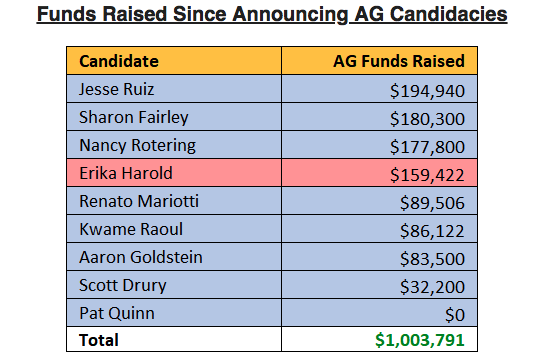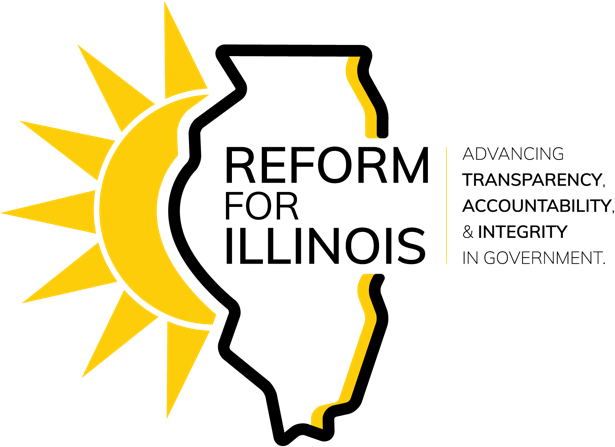Illinois AG Candidates Consider the Office “Front Line” Against President Trump

Facing a crowded field and sharing similar views on the role, fundraising may prove crucial for Democratic Illinois Attorney General hopefuls
|
|
|

Funding Sources Vary in a Vast Candidate Field
While Democratic candidates are mostly unified in their perceived role on the “battlefield,” the sources they have tapped to fund their campaigns vary widely.
Self-funding has emerged as a trend in this race. Although Jesse Ruiz has raised the most money since announcing his candidacy, without the $100,000 loan he made to his campaign in October, Ruiz would fall to the sixth spot in that ranking. Sharon Fairley has contributed $120,000 tor her campaign, representing a majority of her $180,000 in contributions. The table below shows fundraising by all candidates since announcing their candidacy.

Additionally, Chicago Committeeman Aaron Goldstein has loaned his campaign a total of $75,000, collecting only $7,500 from outside sources. Attorney Renato Mariotti also donated $10,000 to his campaign.
Erika Harold’s campaign has relied heavily on support from the Illinois Republican Party. The state party’s in-kind contributions account for 30% of Harold’s funding, mainly by providing consultants and media production for the campaign. An assortment of businesses, political committees, and individuals contributed the rest of Harold’s campaign funds.
Similarly, Senator Raoul has collected most of his campaign contributions from political committees representing a host of interests including labor groups, trade associations, and specific businesses. Raoul also received his largest contribution ($25,000) from Citizens for Antonio Munoz, the campaign committee of Democratic State Senator Tony Munoz.
In contrast, Highland Park Mayor Nancy Rotering leads the field in fundraising from individual donors – every contribution since she announced her run for Attorney General was from an individual. The profile of Rotering’s donors is wide-ranging, including individuals from various professions, although most of them live in Highland Park.
Jesse Ruiz and Sharon Fairley have also been successful in soliciting individual donations, albeit not on the same scale as Rotering. Besides the loan he made to his campaign, Ruiz’s remaining $85,000 came largely from attorneys, executives, and investment bankers, along with a $1,000 donation from State Supreme Court Justice Charles Freeman. However, Fairley’s contributors are mainly listed as self-employed or retired in her filings.
Democratic State Representative Scott Drury and former Governor Pat Quinn sit at the bottom of the fundraising list. Despite his lackluster fundraising since announcing his candidacy, Drury remains comfortably in second place for total funds raised this year. This is due to his more aggressive fundraising during his run for governor earlier in the year, which he ended to join the attorney general’s race. Since he garnered contributions earlier in the year, he could not collect more money from the same donors due to contribution limits.
Quinn, who joined the race on October 27, retains $289,000 in his campaign committee from his unsuccessful 2014 re-election campaign. Quinn has not reported any donations since announcing his run for Illinois Attorney General.
This early in the race, many of the Democratic candidates have yet to differentiate themselves on specific issues, and share a common view on their role in national politics. Raising and spending large amounts of money could prove crucial for candidates to build their profile in this crowded field, and rise above the pack in the polls. As candidates build up their war chests, the fundraising strategy they choose may provide an early indicator of voters’ recognition and enthusiasm for each candidate in the early stages of the race.
Back
